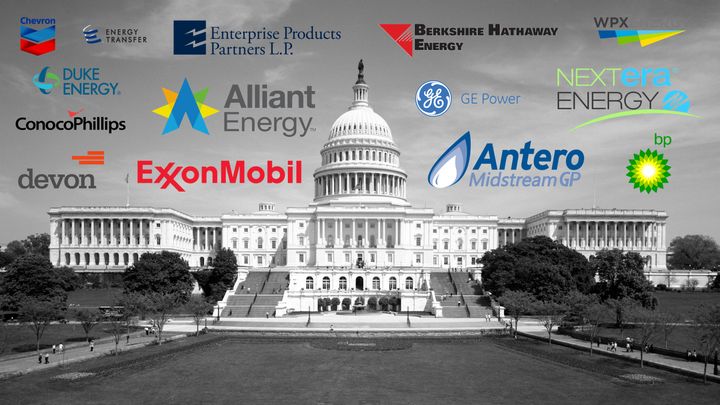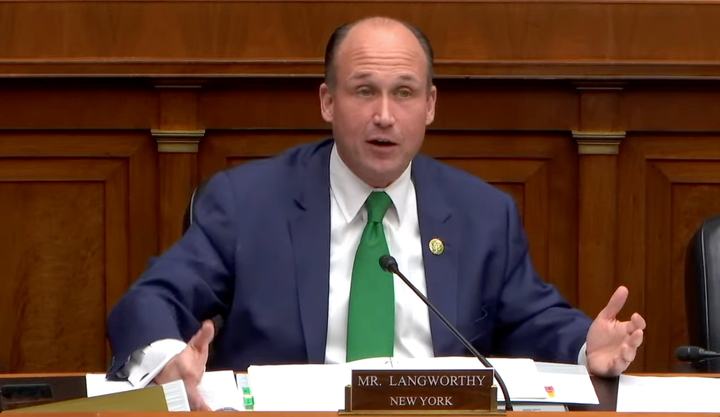As the United States Senate fails to act on catastrophic climate change, dozens of its members are profiting from investments in oil, gas, and coal companies that are fueling the crisis.
Twenty-nine U.S. senators and their spouses own between $3.5 million and $13.9 million worth of stock in companies that extract, transport, or burn fossil fuels, or provide services to fossil fuel companies, according to a Sludge analysis of personal financial filings as of Aug. 16. The senators are invested in 86 fossil fuel companies, including well-known giants like ExxonMobil and Royal Dutch Shell, but also a range of lesser known companies that specialize in pipeline operations, natural gas exports, and oilfield services.
Fossil fuel combustion accounted for about 76% of the greenhouse gases emitted in 2017, according to a June report from the U.S. Energy Information Administration. In 2018, the burning of petroleum products led energy-related carbon dioxide emissions (45% of energy-related carbon emissions), followed by natural gas (31%) and coal (24%). That’s not to mention that natural gas extraction releases large amounts of methane, a greenhouse gas that is about 30 times more potent as a heat-trapping gas than carbon dioxide.
Use the interactive data visualization below to see all the fossil fuel companies that senators are invested in, as well as the names of the senators invested in each company. Berkshire Hathaway and General Electric are included in the analysis because both own subsidiaries in the oil and gas or fossil fuel-driven electricity industries. Scroll over the bubbles and details will appear.
Bubble graph: Which Fossil Fuel Companies Are Senators Invested In?
Top Dems on Energy and Environment Committees Are Big Stock Owners
The largest fossil fuel investment among all senators belongs to Sen. Joe Manchin (D-W.V.), the ranking member of the Senate Energy and Natural Resources Committee, who is in line to chair the committee if Democrats take control of the Senate in 2020. The committee’s legislative jurisdiction covers energy resources and development, nuclear energy, federal coal, oil, and gas, other mineral leasing, and other issues.
Manchin, hailing from the coal-rich state of West Virginia, owns between $1 million and $5 million worth of non-public stock in a family coal business, Enersystems, and in his 2018 financial disclosure he reported earning between $100,001 and $1 million in dividends and interest from the company, as well as $470,000 in “ordinary business income.” Manchin handed over day-to-day operations at Enersystems to his son in 2000, and he moved his holdings into a blind trust between 2005 and 2010, according to the New York Times.
Manchin, who shot a bullet through a cap-and-trade climate change bill in a 2010 campaign ad, received the lowest environmental rating form the League of Conservation Voters among all Senate Democrats in 2018.
Manchin was the only Democrat to vote against an amendment to protect the Arctic National Wildlife Refuge from oil drilling in 2017, and he was one of just three Democrats to vote against an amendment to phase out taxpayer subsidies for coal, oil, and gas producers in 2016. Manchin has also voted to approve construction of the Keystone XL oil pipeline, expedite the approval process for natural gas pipelines, and override an Obama administration rule requiring coal companies to protect groundwater from toxic coal mining waste.
Manchin also receives support from fossil fuel companies in the form of contributions to his campaign committees and leadership PAC. Since 2015, PACs of companies and trade groups in the oil and gas industry have given Manchin’s committees $131,000, while PACs of electric utilities, the majority of which burn natural gas and/or coal, gave $205,500, according to data from the Center for Responsive Politics.
Sludge asked Sen. Manchin’s office if the Enersystem investment poses a conflict of interest for the senator’s work on the Energy and Natural Resources Committee, but did not hear back by the time of publication.
Sen. Tom Carper (D-Del.), the top Democrat on the Environment and Public Works Committee, which handles air pollution, environmental policy, and water pollution, has up to $310,000 invested in more than a dozen oil, gas, and utility companies, as well as mutual funds with holdings in the fossil fuel industry.
Carper has a much stronger environmental record than Manchin, but he has broken from most Democrats on some issues. For example, Carper was one of nine Democrats who voted in favor of a 2015 bill to circumvent the federal regulatory approval process and automatically approve construction of the Keystone XL pipeline. In a statement following the vote, Carper said he voted to approve the pipeline because he “felt that six years of deliberation on this project was enough, and it was time to move on to other matters,” adding that he hoped his vote would “be a signal to my Republican colleagues that I was serious about working together to find common ground on this and other challenging policies.”
Carper owns stock in several companies that operate oil and gas pipelines, including Pembina Pipeline (between $2,002 and $30,000), Chevron, which owns the Chevron Pipe Line Company ($1,001 to $15,000), and Royal Dutch Shell, which owns Shell pipeline company ($1,001 to $15,000). Carper’s largest investment in the fossil fuel industry is $15,001 to $50,000 worth of stock in Duke Energy, an electric power holding company that owns coal-burning and oil- and gas-fired power plants.
Since 2015, Carper’s campaigns have received $35,500 from PACs of companies and trade groups in the oil and gas industry.
Members Profit From ExxonMobil
Oil giant ExxonMobil, the largest oil and gas company in the U.S. by revenue, exerts massive lobbying pressure in Washington D.C. to further its policy goals. The company spent more than $11 million on expenses related to lobbying the federal government in 2018, and its PAC and employees made $2.3 million in federal campaign contributions in the 2018 election cycle.
Eleven members of the Senate—Sens. King (I-Maine), Cassidy (R-La.), Perdue (R-Ga.), Moran (R-Kan.), Kennedy (R-La.), Roberts (R-Kan.), Scott (R-Fla.), Wyden (D-Ore.), Capito (R-W.V.), Collins (R-Maine), and Cruz (R-Texas)—have as much as $856,000 invested in ExxonMobil stock. No fossil fuel stock is owned by a greater number of senators.
The largest ExxonMobil investment among the senators likely belongs to Sen. Jerry Moran, who owns between $102,003 and $280,000 worth of the company’s stock. Moran has told Vote Smart that he does not believe that human activity has contributed to climate change and does not support federal regulation of greenhouse gas emissions.
Scientists and executives at ExxonMobil have known since 1977 that burning fossil fuels contributes to global warming and would have catastrophic effects on the environment, but the company suppressed the information and funded misinformation in order to protect its profits. A Pulitzer Prize winning series from InsideClimate News, based on a review of internal company documents and interviews with former employees, details how the company was warned about the dangers of climate change by scientists well before the general public, but worked to sow confusion on the issue and remove scientists that believed in the consensus around climate science from key government positions.
Today, ExxonMobil is a founding member of the Climate Leadership Council, a coalition that is lobbying for a carbon tax proposal to address climate change that scientists on the United Nations’ Intergovernmental Panel on Climate Change have called an insufficient response at this stage in the climate crisis. The Climate Leadership Council is promoting its carbon tax plan as a more efficient and less expensive alternative to the Green New Deal.
Edited by and with research by journalist Alex Kotch
Read more from Sludge:



